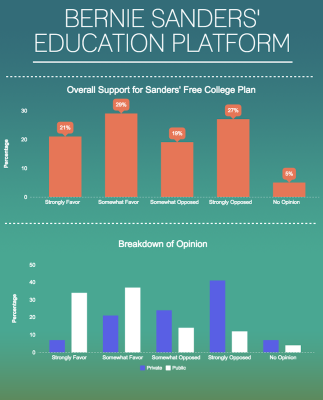
While 2016 presidential candidate Bernie Sanders has been raising some eyebrows with his education platform, few private college presidents support his plans to make higher education free, according to a poll published Tuesday by Gallup/Inside Higher Ed .
Sanders’ plan calls for the federal government to provide states with $18 billion in matching awards to allow for free public higher education. In contrast, his democratic ticket opponent Hillary Clinton is promising lower interest rates on student loans, tougher rules for for-profit higher education and new grants for private colleges that have small endowments and serve large numbers of low-income and minority students.
The Insider Higher Ed poll, which surveyed the 523 college and university presidents, found that overall, 29 percent of presidents somewhat favor Sanders’ ideas, while 19 percent somewhat opposed them. When split up by public and private college presidents, the results become polarized — only 21 percent of private presidents somewhat support his platform and 24 percent somewhat oppose it.
The poll also found that when asked how likely they thought it was for the federal government would adopt debt-free college in the next four years, only 1 percent of all surveyed presidents thought it very likely and 10 percent thought it was somewhat likely.
Boston University spokesman Colin Riley referred to David Warren, president of the National Association of Independent Colleges and Universities, and declined to comment further on the university’s stance on the issue.
The NAICU represents about 1,000 non-profit private universities, including BU. Paul Hassen, spokesman for the NAICU, said that a discussion about making college costs more affordable is an encouraging step in itself, regardless of political affiliation.
“From the association’s perspective, we believe that the national discussion about cost, access and success in higher education is a very positive thing, especially in the light of a presidential campaign,” he said. “But one of the things we very firmly believe is that as it has been for the last 50 years or so, that federal aid money must follow the student, and stay with the student.”
Hassen said the student is the one that must make the choice where they go to school with federal funds.
David Swartz, a professor of sociology in BU’s College of Arts and Sciences, said these conversations are necessary because private universities are competing with each other for the best students. To attract students, these universities are offering amenities students enjoy, such as fitness centers, gourmet food and deluxe dorms.
However, Swartz said the problem students are faced with is the growing concern about student debt to attend expensive institutions, and, as of now, there are no solutions to lessen the cost.
“There is no trend we can discern yet that suggests schools are going to start cutting back on the amounts of money that they need for the expanding services they offer,” he said. “There may be a decrease in growth if tuition increases, but nobody is decreasing tuition, nobody is decreasing the number of services offered, and therefore schools are continually getting more expensive.”
Several students said they side with Clinton’s plan over Sanders’ free public education plan.
“I kind of like how Hillary Clinton cares about public schools and private schools as well, and her way of approaching this is more possible,” said Jiajia Liu, a freshman in the Questrom School of Business.
Eddie Da Graca, a freshman in the Sargent College of Health and Rehabilitation Sciences also said that Clinton’s course of action may be the most effective.
“I think [the lack of private university presidents supporting Sanders is] because private schools cost more than public schools,” he said. “So, it’s better to give money to public and private, so that’s why people will go with Clinton over Sanders. [Private college presidents] want money in both private and in public schools.”
Sandra Rosado, a CAS sophomore, said she sees an ulterior motive to private school opposition to Sanders’ plans.
“It makes sense for private school presidents to oppose Bernie Sanders, because they would be hiding their own bias by helping something that would help the public sector,” she said. “So if they oppose strongly free education for public schools, then it hides their bias against not wanting free education for private schools.”
CORRECTION: An earlier version of this story identified Paul Hassen, director of communications for the NAICU, as David Warren, its president.




















































































































